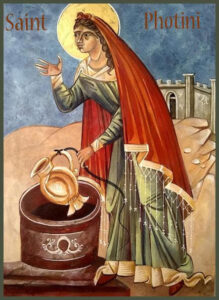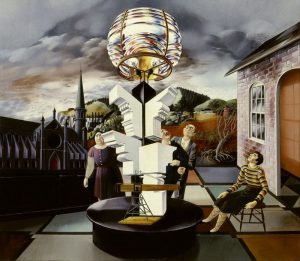 We are gathered here today to honor and remember our friend and sister in Christ, Hildegarde B_____; to give thanks for her life and witness; to pray for her repose and for comfort for those who love her; and to praise God for God’s ineffable goodness. As many of you know, at times like these I turn to the work of the poets to help me process and understand the events of life. We have in our readings from Holy Scripture the work of the poet called “Qoheleth the preacher”, the famous opening of the third chapter of Ecclesiastes, set to music by Pete Seeger in the 1950s and made popular in the 1960s by The Byrds. Hildegarde selected that reading both for her husband Earl’s funeral and for her own.
We are gathered here today to honor and remember our friend and sister in Christ, Hildegarde B_____; to give thanks for her life and witness; to pray for her repose and for comfort for those who love her; and to praise God for God’s ineffable goodness. As many of you know, at times like these I turn to the work of the poets to help me process and understand the events of life. We have in our readings from Holy Scripture the work of the poet called “Qoheleth the preacher”, the famous opening of the third chapter of Ecclesiastes, set to music by Pete Seeger in the 1950s and made popular in the 1960s by The Byrds. Hildegarde selected that reading both for her husband Earl’s funeral and for her own.
I’ll come back to the words of Qoheleth in a moment, but the poem that came to mind as I considered what I might say about or learn from Hildegarde is one by the contemporary British artist, poet, and cyclist Carlo Castelvecchio entitled A Ride Through Time:
I ride through time,
Stretching it out with surreal distortion,
I ride for freedom,
I am immortal, freedom from the fear of death,
I push myself to the limit of my mortal frame,
then transcend that human pain,
enter into that fourth dimension.
My wheels no longer touch the ground,
they’re floating on passionate effort,
a whole-hearted, single-minded effort,
the rhythm of a perfect circle,
a pulsing rhythm that rises above the world’s woes.
Movement brings freedom.
Unfettered yet fitting in perfectly,
unconventionally conventional,
an independent form of movement.
I know exactly how far I have traveled,
I can feel how far I have moved.
Allow the spirit of your surroundings to feed your movement,
the harder I push the more I merge with my surroundings,
my aim is to reach that point of effortless movement,
turbo boosted blood pumping round my muscles,
my spirit is one with my body,
brain, muscles and spirit in total harmony,
producing a pure single-minded effort,
human body, trees, mountains, rivers, spirits and bike.[1]
She was a strong woman, a strong-willed woman, sometimes abrasively so. She was opinionated and not unwilling to share those opinions, which she was quite convinced were correct and, if you disagreed with her, you were simply wrong. She might occasionally have been what one would call “cantankerous,” sometimes “curmudgeonly,” but mostly she was just forthright and plain spoken, take it or leave it as you would. Her name was Martha __________.
(I’ll bet you thought I was describing someone else….)
Martha __________ was the director of the Altar Guild at St. Francis of Assisi Episcopal Church where I was rector for ten years before coming to Medina. She was also a very active participant in every educational offering ever made at St. Francis Church. Bible studies, Anglican or Episcopal history courses, Lenten soup-supper programs, whatever, Martha took part in them all and in every one, eventually, Martha would get us around to what she really wanted to talk about: “What I want to know,” she would ask, “is what’s going to happen when I die?” I came to think of that, and still think of it, as “the Martha __________ question” – “What’s going to happen when I die?”
About three weeks ago around noon on a Friday, Jennifer B_____ called me to ask if I could stop by her mother’s room at Brookdale; Hildegarde wanted to talk to me. “Sure,” I said, “but not today. Would tomorrow be all right?” She said it would and so on Saturday morning, I went to see Hildegarde. After an exchange of pleasantries, we got around to what she wanted talk about. I could see it coming a mile away . . . the Martha __________ question! “What’s going to happen when I die?” Now, it’s the Hildegard B_____ question . . . and I gave Hildegarde the same answer I gave Martha.
What I told them, and what I tell you, is that I don’t know what happens when we die! I haven’t done that yet; I haven’t been there yet. However, what I could tell them and what I now tell you is what I believe, what I understand our faith to teach. First, I believe that everyone who dies rests in the Lord in a place – or perhaps it’s better to say a state of being – we name Paradise, and we rest there until what the church calls “the last great day,” the day of the general resurrection when (as the Evangelist Luke put it paraphrasing the prophet Isaiah) “all flesh shall see the salvation of God.”[2] On that day, we will be reunited with our loved ones and together we will stand before the throne of God. On that day, we will face judgment about which Jesus told us:
When the Son of Man comes in his glory, and all the angels with him, then he will sit on the throne of his glory. All the nations will be gathered before him, and he will separate people one from another as a shepherd separates the sheep from the goats, and he will put the sheep at his right hand and the goats at the left.[3]
But on that day we will also find mercy and forgiveness, for we are called to “approach the throne of grace with boldness, so that we may receive mercy,”[4] and “mercy triumphs over judgment.”[5] Thus, St. Paul could rightly assure us
. . . . that neither death, nor life, nor angels, nor rulers, nor things present, nor things to come, nor powers, nor height, nor depth, nor anything else in all creation, will be able to separate us from the love of God in Christ Jesus our Lord.[6]
In the end, I believe, and I believe our faith teaches us, that we will be united with God in love.
That, of course, is from the human perspective of time, of chronos as it was called by the Greeks. It is this chronological time about which Qoheleth wrote when he said that “for everything there is a season, and a time for every matter under heaven: a time to be born, and a time to die . . . a time to mourn, and a time to dance . . . a time for war, and a time for peace.”[7] In Hildegarde’s life there was a time to be born, a time to experience the exotic sights and sounds of Tehran as a teenager in the early ‘50s, a time to fall in love with Earl B_____, get married, raise a family, a time to complete a couple of degrees and to teach high school English, a time to know the joys of piloting her own plane and to bicycle across the hills and through the valleys of Michigan and Ohio. This is how we humans experience time and so we think in terms of the Martha McEldowney question.
But there is another way to think of time and that is how we believe God sees it, what theologians call kairos, another Greek word for time. In Greek, it means “the critical time” or “the opportune moment.” Theologically, it is what theologian Paul Tillich called “the eternal now”[8] in which all those times listed in Ecclesiastes, all the times of our lives are the same moment, now. This is what the author of the letter to the Hebrews hints at when he says that “Jesus Christ is the same yesterday and today and forever.”[9] This is what John of Patmos tried to express when he described God as the one “who is and who was and who is to come.”[10] This is what we try to express in our liturgy when we end a psalm with the Gloria Patri saying, “Glory to the Father, and to the Son, and to the Holy Spirit: as it was in the beginning, is now, and will be for ever.”[11]
We struggle to describe kairos, though occasionally we are able to perceive it through our prayer or our music. Sometimes we feel it during worship; in Eastern Orthodox theology, Divine Worship is understood to be an intersection of chronos and kairos. We are, however, limited creatures, trapped in chronos, and so we cannot fully experience God’s “eternal now” until that “last great day” when, as our lesson from the First Letter of John puts it, God “is revealed, [and] we will be like him, for we will see him as he is.”[12]
That is what I believe, and what I believe our faith teaches us, that in the end we will be united with God in love, and experience God’s kairos. As St. Paul wrote in his first letter to the Corinthians, “Now we see in a mirror, dimly, but then we will see face to face. Now I know only in part; then I will know fully, even as I have been fully known. And now faith, hope, and love abide, these three; and the greatest of these is love.”[13]
In that “eternal now,” we will (as our gospel lesson promises) abide in Christ’s love, just he abides in the Father’s love.[14] We will, as cyclist-poet Carlo Calvecchio wrote, “ride through time . . . immortal . . . free from the fear of death . . . in total harmony” with our Creator and with one another.
I believe that was what Hildegarde experienced in her cycling, the harmony about which Calvecchio wrote, and I believe that is what she is experiencing now, what we will all experience when our chronos finally and eternally intersects God’s kairos.
As I was looking for Calvecchio’s poem, I found another short piece by another cyclist poet with whose words I will close. This is October Warm by Michael Blotzer:
I cannot turn
down the road
to the house
where dinner waits
The morning’s frost
into October warm evaporated
and the road stretches through red and gold
to a sky as blue as the black of space
The rhythm of heart and lungs
of legs and cranks
the whisper of chain and gears
of tires on pavement
form a mantra that chants
There is no past
no future
there only
is.[15]
As our Book of Common Prayer expresses it, in death “life is changed, not ended; and when our mortal body lies in death, there is prepared for us a dwelling place eternal in the heavens.”[16] “Death [is merely] the gate of eternal life [through which] we [will be] reunited with those who have gone before.”[17]
And that, Hildegarde – and Martha – and all of you, that is what I believe and what I believe our faith teaches us happens when we die. No past, no future, only God’s eternal now, reunited with all who have ever been important to us and, in the words of our opening hymn, filled with God’s goodness and lost in God’s love. Hildegarde, the Christian hope is that some day we will see you again and confirm that what I told you is true!
Let us pray:
Almighty God, with whom still live the spirits of those who die in the Lord, and with whom the souls of the faithful are in joy and felicity: We give you heartfelt thanks for the good examples of all your servants, who, having finished their course in faith, now find rest and refreshment. May we, with all who have died in the true faith of your holy Name, have perfect fulfillment and bliss in your eternal and everlasting glory; through Jesus Christ our Lord. Amen.[18]
====================
This homily was offered by the Rev. Dr. C. Eric Funston on November 24, 2018, at the Requiem Mass for Hildegarde B_____ at St. Paul’s Episcopal Church, Medina, Ohio, where Fr. Funston was rector.
The lessons used for the service (selected by the family of the decedent) are Ecclesiastes 3:1-8; Psalm 23; 1 John 3:1-2; and St. John 15:9-12.
The illustration is Bicycle Day by John Speaker, available for purchase here. Used here with permission of the artist.
====================
Notes:
Click on footnote numbers to link back to associated text.
[1] Bicycling Poetry, Bicycle Life, online
[2] Luke 3:6
[3] Matthew 25:31-33
[4] Hebrews 4:16
[5] James 2:13
[6] Romans 8:38-39
[7] Ecclesiastes 3:1-2,4,8
[8] See Tillich, Paul, The Eternal Now (Charles Scribner’s Sons, New York:1963)
[9] Hebrews 13:8
[10] Revelation 1:8
[11] Daily Morning Prayer: Rite Two, The Book of Common Prayer 1979, page 80
[12] 1 John 3:2
[13] 1 Corinthians 13:12-13
[14] John 15:10
[15] Bicycling Poetry, op. cit.
[16] Proper Preface: Commemoration of the Dead, The Book of Common Prayer 1979, page 382
[17] Burial of the Dead, Rite Two, Opening Collect, The Book of Common Prayer 1979, page 493
[18] Burial of the Dead, Rite Two, Additional Prayers, The Book of Common Prayer 1979, page 503
 We “boast in our sufferings,” writes Paul to the Romans, “knowing that suffering produces endurance, and endurance produces character, and character produces hope, and hope does not disappoint us….”[1] It sounds, doesn’t it, like Paul is encouraging the Romans to brag about their problems and how well they handle them, as if endurance, character, and hope were the prizes handed out in some sort of “affliction Olympics.”
We “boast in our sufferings,” writes Paul to the Romans, “knowing that suffering produces endurance, and endurance produces character, and character produces hope, and hope does not disappoint us….”[1] It sounds, doesn’t it, like Paul is encouraging the Romans to brag about their problems and how well they handle them, as if endurance, character, and hope were the prizes handed out in some sort of “affliction Olympics.” In today’s Gospel, we are again in that long discourse from John’s Gospel which Bible scholars call “The High Priestly Prayer.” We’ve heard various parts of this prayer throughout the Easter Season. In this part of the prayer, Jesus asks of the Father, on behalf of the disciples, “Sanctify them in the truth; your word is truth. As you have sent me into the world, so I have sent them into the world. And for their sakes I sanctify myself, so that they also may be sanctified in truth.”
In today’s Gospel, we are again in that long discourse from John’s Gospel which Bible scholars call “The High Priestly Prayer.” We’ve heard various parts of this prayer throughout the Easter Season. In this part of the prayer, Jesus asks of the Father, on behalf of the disciples, “Sanctify them in the truth; your word is truth. As you have sent me into the world, so I have sent them into the world. And for their sakes I sanctify myself, so that they also may be sanctified in truth.” Monday being “Memorial Day,” this weekend, in the traditions of our country, we are remembering and celebrating those who have fought on behalf of, and given their lives for, the United States. In the traditions of the church today, we are celebrating something called “Rogation Sunday,” on which we give thanks for the abundance of the earth and ask God’s blessings upon agricultural pursuits, upon the fields and the herds. I’d like to read you a story about giving thanks for abundance. It is from the Paul Harvey radio program.
Monday being “Memorial Day,” this weekend, in the traditions of our country, we are remembering and celebrating those who have fought on behalf of, and given their lives for, the United States. In the traditions of the church today, we are celebrating something called “Rogation Sunday,” on which we give thanks for the abundance of the earth and ask God’s blessings upon agricultural pursuits, upon the fields and the herds. I’d like to read you a story about giving thanks for abundance. It is from the Paul Harvey radio program. A few years ago, at my former parish, we had a Sunday school presentation in which each of the kids was to recite a verse of Scripture. On little guy came up and just stood there, shuffling his feet and looking very uncomfortable; he just couldn’t remember his line… His mother was in the front row to prompt him. She gestured and formed the words silently with her lips, but it did not help. Her son’s memory was blank. Finally, she leaned forward and whispered the cue, “I am the light of the world.” The child beamed and with great feeling and a loud clear voice said, “My mother is the light of the world.”
A few years ago, at my former parish, we had a Sunday school presentation in which each of the kids was to recite a verse of Scripture. On little guy came up and just stood there, shuffling his feet and looking very uncomfortable; he just couldn’t remember his line… His mother was in the front row to prompt him. She gestured and formed the words silently with her lips, but it did not help. Her son’s memory was blank. Finally, she leaned forward and whispered the cue, “I am the light of the world.” The child beamed and with great feeling and a loud clear voice said, “My mother is the light of the world.” Anthelme Brillat-Savarin , an 18th century French politician once said, “Tell me what kind of food you eat, and I will tell you what you what kind of man are.”
Anthelme Brillat-Savarin , an 18th century French politician once said, “Tell me what kind of food you eat, and I will tell you what you what kind of man are.” In today’s Gospel lesson we heard, as we always hear on the Second Sunday of Easter Season, the story of “doubting Thomas.” What is striking about the Thomas’s demand … “unless I see” … is that our Lord accepts and encourages it … “Reach out your hand.”
In today’s Gospel lesson we heard, as we always hear on the Second Sunday of Easter Season, the story of “doubting Thomas.” What is striking about the Thomas’s demand … “unless I see” … is that our Lord accepts and encourages it … “Reach out your hand.”
 Children, as those of us who have had or who have been children know, grow in their ability to communicate. Vocabularies grow. Grammars develop. They move from simple one- or two-syllable concepts – such as “Mama” or “Dada” or “NO!” – to more complex ideas.
Children, as those of us who have had or who have been children know, grow in their ability to communicate. Vocabularies grow. Grammars develop. They move from simple one- or two-syllable concepts – such as “Mama” or “Dada” or “NO!” – to more complex ideas. For recreational reading these days, I’m into a novel entitled Winter of the Gods.
For recreational reading these days, I’m into a novel entitled Winter of the Gods.

